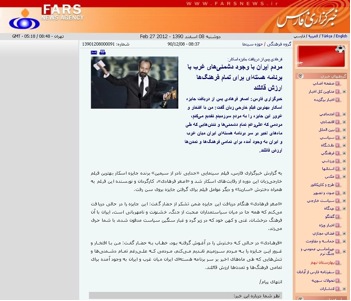A Separation, Asghar Farhadi’s Oscar winning film, gave Iranians a reason to come together and celebrate this moment, which could have potentially taken the focus away from war and nuclear program. The media on both sides, however, missed the moment.
On Sunday, 26 February, Asghar Farhadi began his acceptance speech by greeting “the good people of my homeland” and saying:
“Many Iranians all over the world are watching us and I imagine them to be very happy. They are happy not just because of an important award or a film or filmmaker, but because at the time when talk of war, intimidation and aggression is exchanged between politicians, the name of their country Iran is spoken here through her glorious culture, a rich and ancient culture that has been hidden under the heavy dust of politics.”
The news went viral on Facebook and Twitter. YouTube clips captured the moment when Farhadi held the golden statue for Best Foreign Film. The Guardian’s Saeed Kamali Dehghan reported that millions of people in Iran had stayed up to watch the Oscars on their satellite televisions. A special Facebook page aggregated messages from well wishers. Iranian journalist Reza Asadi tweated, “Imagine: Iranians are now waking up to find the world is talking about its cinema, not its nuke, for a change." The jubilations even echoed through Iran’s prisons. More than fifty political prisoners congratulated him for winning the Oscars.
So, how did the media capture this moment and heed his call to go beyond politics du jour? Alas, habits being hard to break, even this marvelous opportunity was used instead as a platform for media on both sides to go ballistic.
No sooner had Farhadi held the golden statue in his hand than Haaretz led with the inflammatory AP/Reuters generated headline ”Iranian film beats Israel`s `Footnote` at Academy Awards.” This set the tone for all Western media that followed.
Yahoo’s Jonathan Crow wrote: “Farhadi inserted himself in an increasingly rancorous geo-political debate and followed by stating how his speech might be unpopular with certain segments of the American public.”
In a further bow to the current saber-rattling concert, the AP’s Jerusalem correspondent interviewed Israeli filmgoers to get their reaction to A Separation. In that piece, Moshe Amirav, a political science professor at Hebrew University in Jerusalem, said he “didn’t stop thinking about the bomb the whole time” he was watching “A Separation.” Several US national and local news outlets picked up this article, including National Public Radio (NPR), The Washington Post, and The Guardian, without any counter narrative to this distorted view of Iran.
Thomas Erdbrink of The Washington Post, based in Iran since 2001, even called the win "the best public diplomacy for the Islamic Republic in many years.”
If Western media clearly missed an opportunity to use the beauty of art and culture to bridge lingering political differences, what were, one might ask, the reactions of the Iranian media, which one might think could have seized the opportunity to show grace and magnanimity in response to such an olive branch coming from, of all places, Hollywood?
Unfortunately, the Iranian regime, as the saying goes, never misses an opportunity to miss an opportunity. Its media outlets also used the Oscar win as a stage to promote their own political agenda. The state media called it a triumph over the “Zionist regime.” Finding Oscar-winner Farhadi’s acceptance speech much too mild and accommodating, Fars news—often derided as “False news”—decided to fabricate part of the speech and put the following words in his mouth: “I proudly offer this award to the people of my country who, despite all the tensions and hostility between Iran and the West over Iran`s nuclear program, respect all cultures and civilizations.”
What Farhadi, in fact, said was: “I proudly offer this award to the people of my country, the people who respect all cultures and civilizations and despise hostility and resentment. Thank you so much."

[Commentary on the Oscars. Image from Fars News]
Out of embarrassment, Fars News later removed the fabricated excerpt, but it was already too late. The original version had been captured by bloggers and went viral on the Internet.
As for Iranian regime mouthpiece Press TV, it simply republished the English version of the Fars News report of the film’s Oscars victory in English with minor modifications. Press TV also played Asghar Farhadi’s tape of his acceptance speech without letting viewers hear what he actually was saying.
Ironically, as London-based journalist and writer Kamin Mohammadi reminds us in her piece, A Separation almost did not happen:
“Back in 2010, Mr. Farhadi had criticized Iranian cultural policy for isolating a number of prominent cineastes. The production license for `A Separation`—which was then shooting—was immediately revoked. The Ministry of Culture accused Farhadi of advocating on behalf of "counter-revolutionary" moviemaker Makhmalbaf and the ban was not lifted until Farhadi publicly distanced himself from other controversial Iranian filmmakers.”
Think Progress’ Ali Gharib’s wrote: “Iranian State Media Apparently Did Not Listen To Asghar Farhadi’s Oscar Acceptance Speech.” Unfortunately, neither did the media in the United States. Or perhaps they did listen but did not hear anything that quite fit the saber-rattling narratives the world has been fed by the US, Iranian, and Israeli propaganda machines.
Additional links:
- Video: Iranian Cinema Under Siege
- DP/30: A Separation, writer/director Asghar Farhadi: An In-Depth Interview with Asghar Farhadi
- Massoud Bakhshi, The Economic Times: Oscar Awards 2012: Asghar Farhadi`s Oscar could take Iranian cinema to the global market Iran`s Oscar:
- Babak Dehghanpisheh: Iran`s Oscar: The Delicate Victory Dance of the Director of A Separation